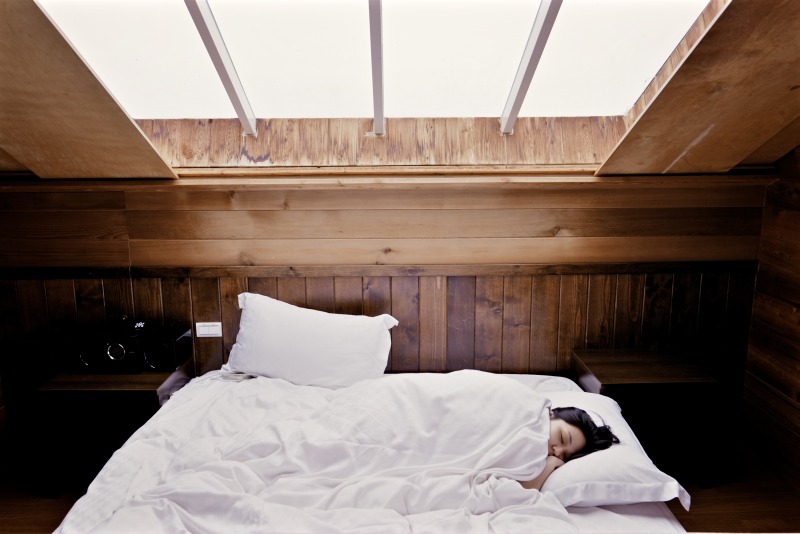Top Sleep Tips
Often, trouble sleeping is due to bad habits built up over time. This means it will be difficult to fix in 1 day (or night!) If you persist with the advice below you should notice improvements in your sleep quality. Above all, don’t obsess about your sleep problems, one poor night’s sleep is not a problem. Just return to your good sleep habits the next night. However, if despite good sleep habits you still have difficulty, then see your doctor as something else may be disturbing your sleep.
- Go to bed at the same time every day. The body’s natural clock makes you sleepy when you’re ready for bed. Going to bed too late or too early can lead to disturbed sleep.
- Get up at the same time every day. This helps to synchronise your body clock. Try to avoid making up for a poor night’s sleep by sleeping in. However, relax! The odd late night or sleep in won’t hurt.
- Bedroom. Make this important room relaxing, i.e.
- Have the temperature about 18°C. If this temperature is too cold for you, warm the room or wear warm, comfortable night-wear. Warm hands and feet are particularly important. Invest in a comfortable pillow and mattress.
- Keep noise and light as low as possible. This includes removing beeping watches/clocks/electronic devices. Use a non-ticking/beeping/non-phone based alarm clock if you have to ensure waking at a certain time.
- Use your bed only for sleep and sex, not as another lounge! Reinforce your bed as place that is for sleeping.
- A warm bath about an hour before bed raises your body temperature which when it subsequently falls helps you sleep.
- Exercise every day. It is proven that exercise improves restful sleep. Before dinner or in the morning are the best times. However relaxing styles of yoga can be helpful anytime up to bed-time.
- Daylight. Exposure to natural daylight helps you produce melatonin (a sleep promoting hormone). Sunlight early in the day especially helps synchronise your body clock.
- Pre-bed activity. Some activity, such as watching an exciting movie, or having important/stressful family discussions stimulates your mind. It is best to avoid worrying about/planning the next day’s activity.
- Try to work out your individual sleep need by experimenting. Most people need between seven and nine hours sleep each day (which includes naps).
- Dietary:
- Don’t drink caffeine containing drinks (coffee, tea, cola, energy drinks) after 4pm. A glass of warm milk works well due to the natural sedatives it contains. Try not to drink too much before bed to avoid waking to urinate.
- Don’t Go to bed too hungry or too full, or eat too late, i.e. after 7pm
- Naps. Ideally don’t nap. If you normally have a daytime nap and it doesn’t affect your night sleep, you can keep doing this but try not to sleep in the evening as it will make it harder to fall asleep at night.
- If you wake. If you don’t fall back to sleep in about 20-30 minutes, get up and do a boring activity, e.g. reading, meditation or emptying the dishwasher, in another dimly lit room. Don’t watch TV, check your phone or use the computer as these stimulate the brain. When you are tired, go back to bed.
- Sharing your bed with children or pets. Parents sleeping with young children and people with pets, have been shown in research, to sleep less and have more disturbed sleep.
- Don’t clock watch. Thinking about the time and the bright lights or ticking from clocks make it harder to sleep.
- Nicotine is a stimulant that makes it harder to sleep. Stopping smoking also helps your health in so many ways.
- Alcohol can make people sleepy but it can lead to multiple annoying and health issues, e.g. waking you up to urinate, worse snoring and sleep apnoea, broken sleep, and waking you up early.
- Sleeping tablets. Sleeping tablets should only be used if a specific event has temporarily caused sleeping problems. They are for short term and occasional use only as they are addictive and can cause daytime sleepiness. They can also cause “rebound” insomnia i.e. trouble sleeping due to coming off sleeping tablets.
- Natural remedies. Some natural remedies (available from pharmacies and health food shops) can be beneficial. The New Era homeopathic remedy ‘Insomed’ and the Bach flower remedy, ‘Rescue Sleep’ are the ones I usually recommend but check with your doctor first to make sure these will not interact with your medications/are unsuitable for you.
- Ruminating thoughts. This is where our mind races with thoughts of previous life events (including what happened that day) or worries about future events. A good trick to help with this is to keep a notepad and pen by your bed and write down any thoughts about events/tasks to do. This gets the thoughts out of your head (so you can sleep) and onto the paper.
- Medical conditions. Sleep problems can be caused by underlying medical problems, including depression, thyroid issues etc. It is therefore important to see your doctor to rule out underlying causes.
- Meditation. Meditation, cognitive behavioural therapy and mindfulness are all helpful techniques for helping with a range of medical problems including sleep problems.

